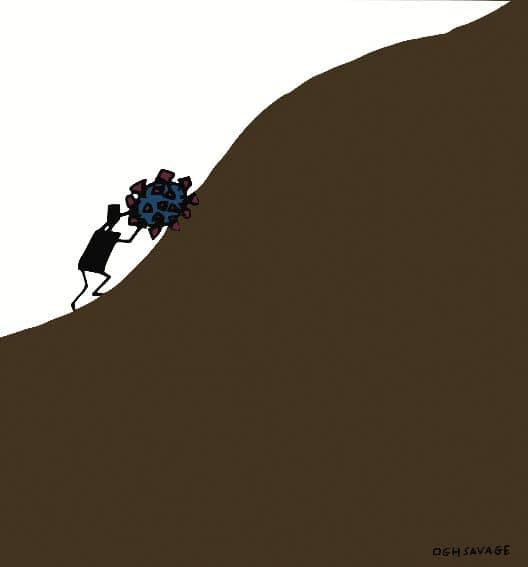
Many popular reading lists for the COVID-19 pandemic include The Plague, a 1947 novel by Albert Camus. The author was an existentialist philosopher who was also a journalist, a writer, and a member of the French Resistance to the Nazi occupation. Camus was born in Algeria, and his father died soon after his birth. For a fascinating glimpse into Camus’ life, have a look at Albert Camus: A Biography, by Herbert R. Lottman.
Though he disavowed being called an existentialist as a means to avoid association with Jean-Paul Sartre, a one-time friend turned enemy, Camus’ work nevertheless centers upon existentialist themes, such as each person’s need to take responsibility for their own choices and actions and in doing so to create meaning for their lives. For the existentialists there is no yardstick by which to measure meaning; rather human beings ascribe meaning to life themselves. Camus’ unique twist on this involves couching it within ‘the absurd’. For Camus, we must take responsibility for creating meaning for ourselves just because of the fundamental absurdity of life – the mismatch between what we would want from life and what it actually gives us. And perhaps the most absurd part of the entire affair is that we never find out if we did it right or not. In The Plague living virtuously is presented as one way of creating meaning. But for Camus, even virtue is not meaningful beyond what it means to the one who has it.
This story is from the {{IssueName}} edition of {{MagazineName}}.
Start your 7-day Magzter GOLD free trial to access thousands of curated premium stories, and 9,000+ magazines and newspapers.
Already a subscriber ? Sign In
This story is from the {{IssueName}} edition of {{MagazineName}}.
Start your 7-day Magzter GOLD free trial to access thousands of curated premium stories, and 9,000+ magazines and newspapers.
Already a subscriber? Sign In

Metaphors & Creativity
Ignacio Gonzalez-Martinez has a flash of inspiration about the role metaphors play in creative thought.

Medieval Islam & the Nature of God
Musa Mumtaz meditates on two maverick medieval Muslim metaphysicians.

Robert Stern
talks with AmirAli Maleki about philosophy in general, and Kant and Hegel in particular.

Volney (1757-1820)
John P. Irish travels the path of a revolutionary mind.

IT'S A WONDERFUL LIFE
Becky Lee Meadows considers questions of guilt, innocence, and despair in this classic Christmas movie.

"I refute it thus"
Raymond Tallis kicks immaterialism into touch.

Cave Girl Principles
Larry Chan takes us back to the dawn of thought.

A God of Limited Power
Philip Goff grasps hold of the problem of evil and comes up with a novel solution.

A Critique of Pure Atheism
Andrew Likoudis questions the basis of some popular atheist arguments.

Exploring Atheism
Amrit Pathak gives us a run-down of the foundations of modern atheism.